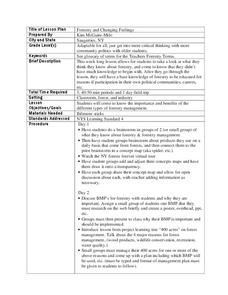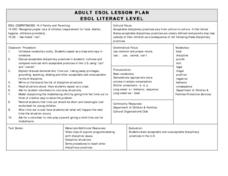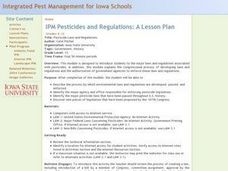Curated OER
Forestry and Changing Feelings
Students investigate how the forest affects their daily lives by creating a concept map. In this ecological lesson, students create a concept map linking the forest to the many things they use each day. Students take a field...
Curated OER
Fitness Analysis
Learners study how to monitor their personal status of their body composition. They study how to monitor and adjust activity levels to meet personal fitness needs and demonstrate objectives 1 and 2 by using the software provided by Furtex.
Curated OER
Building A Portfolio
Students gather images that are part of portfolio to be shared throughout the course of one school year. They complete written reflections based upon the images that are attained. The primary sources for the images is using a digital...
Curated OER
Across Five Aprils-Civil War Virtual Field Trips
Eighth graders explore the Civil War by reading Irene Hunt's novel, Across Five Aprils. They take virtual field trips to these battle sites and answer questions that guides them in their study of the Civil War.
Curated OER
What is Weather?
Students identify different types of weather and explore the weather for each season of the year. They complete a class seasonal weather chart, listen to the book "Oh Say Can You Say What's the Weather Today?," and create a magazine...
Curated OER
Distribution of children living at home
Students use E-STAT to examine demographics. In this social demographics lesson, students use statistical data to determine if a particular family is in need of assistance. Students will discuss social and educational policies and...
Curated OER
Understanding MyPlate
Sixth graders recognize how using the food pyramid can add to their good health practices. In this food pyramid lesson, 6th graders build a 3-D food pyramid illustrating the desired amount of each food group.
Curated OER
Hand Washing: I can handle it!
Sixth graders examine microorganisms. In this germs instructional activity, 6th graders observe and record data on the positive and negative aspects of microorganisms. Students complete activities, view a film, and explore...
Curated OER
Attributes of Renewable Energy: From Nanopossibilities to Solar Power
Students explore solar energy, why we use it and how we use it. In this renewable energy lesson students compare active and solar techniques.
Curated OER
Thirsty for Drought Relief
Young scholars research a variety of drought-related concerns, acting as part of a 'drought preparedness taskforce.' They propose next steps for the government to take in case of drought and assess the viability of these proposals.
Curated OER
Drugs: Prevention Tips
Students use the Internet to examine ways they can prevent using drugs. They discover the dangers of these substances and complete online quizzes.
Curated OER
ESOL Family and Parenting
Sstudents discuss disciplinary options when parenting. They compare and contrast what was acceptable in their native country with what is acceptable in America. They list courses that are available to parents. They write one paragraph...
Curated OER
Earthquakes
Students inspect the causes and effects of earthquakes and examine how seismic waves travel. For this earthquake lesson, students determine where earthquakes happen and why, before determining how to build an earthquake resistant...
Curated OER
Government
Second graders run for various offices. They dress up like a politician, pretend to be running for an office, and tell the students why they should vote for him/her. They explain why it is necessary for a community to have a government
Curated OER
Mountain Pine Beetles
Students research and develop power point presentations that answer the question, "What is changing our forests?" In this ecology lesson, students research the niche of Pine Beetles and their increased effect on the forests in...
Curated OER
Arthropods at Home- Spider, Isopod, or Any Arthropod
Students design a habitat for an arthropod. In this organisms lesson, students read the book, A House is a House For Me. Students find an arthropod and create a terrarium.
Curated OER
Pesticide Laws and Regulations
Students explore the laws and regulations of pesticides. For this pesticides lesson, students research how laws are made and identify the agencies responsible for enforcing the laws. Students research the Internet for laws and bills...
Curated OER
Kids Need Natural Resources
Third graders define renewable and non-renewable resources and give multiple examples of each type of resource. In this environmental science lesson, 3rd graders sort picture cards into two categories, renewable and non-renewable...
Curated OER
Wild About Wildfires
Learners conduct a debate. In this wildfire and controlled burning lesson, students watch the video "Legacy of Fire" and discuss the topic of wildland fires and controlled burns. Half of the class researches the arguments for these...
Curated OER
Keeping Watch on Coral Reefs
Students investigate the dangers Coral Reefs face by investigating satellite images. In this environmental protection lesson, students utilize the Internet to discover the types of satellites and sensors used to provide...
Curated OER
Recycling
Students explore the recycling process. In this recycling lesson, students gain understanding of how garbage is disposed of. Students makes lists of things that can be recycled. Students discuss how animals and plants are damaged by...
Curated OER
Brain Awareness Week
Middle schoolers explore human anatomy by completing a list of activities over five days. In this brain science lessons, students examine images of brains and identify the different parts. Middle schoolers complete an in-class quiz...
Curated OER
Brain Awareness Week Lessons
Students explore the human brain and nervous system. In this brain awareness lesson plan, students examine specific terms with regards to the human brain. Students discover the brain's structure and function and how it functions as the...
Curated OER
Science: Plate Tectonics, Faults, and Volcanoes
Eighth graders conduct Internet research on plate tectonics, faluts, and volcanoes. In groups, they compile information related to teacher-provided questions. Students write papers detailing their findings and make oral presentations...

























